Grimble at Christmas
Read Grimble at Christmas Online
Authors: Quentin Blake

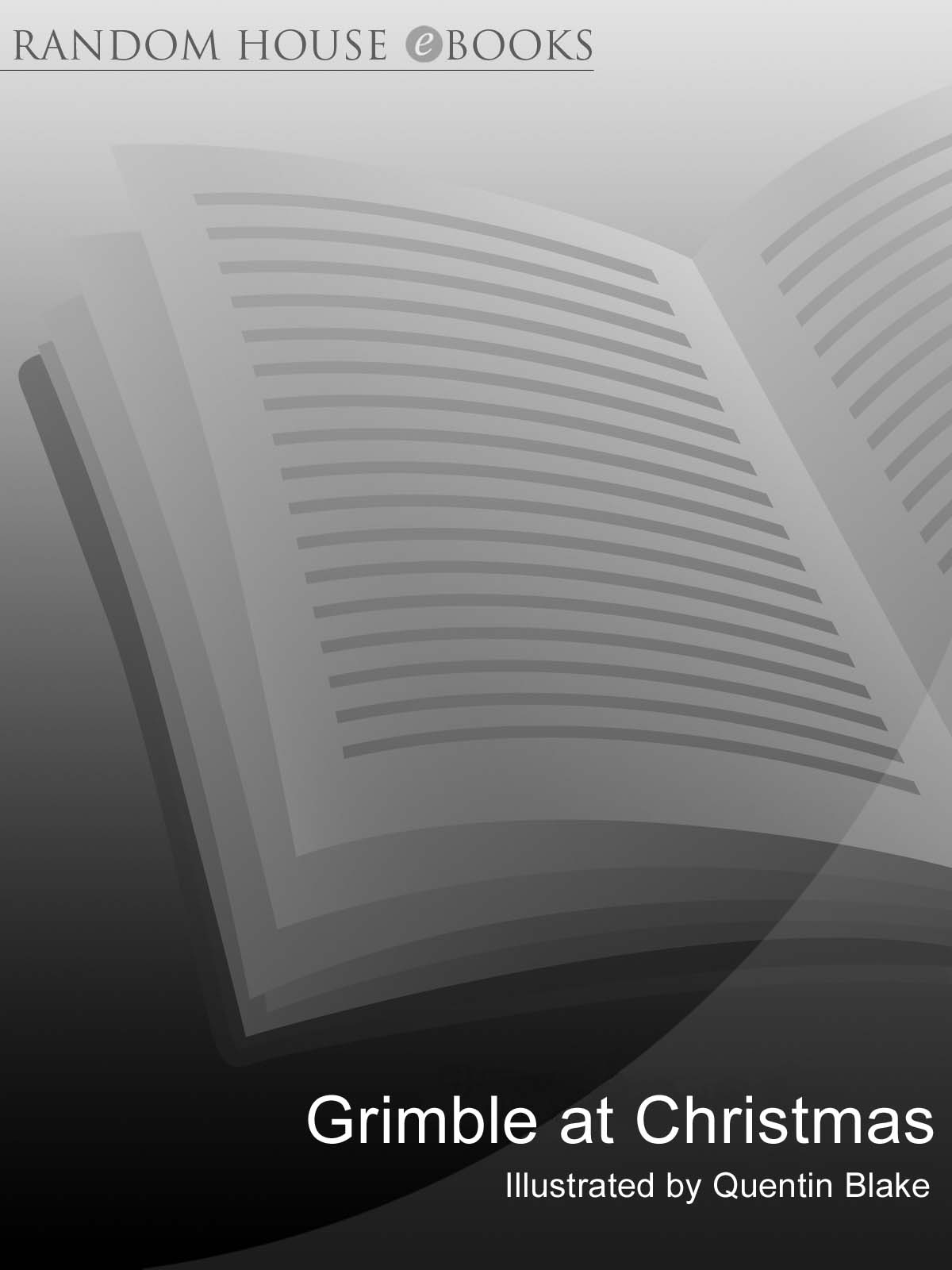
GRIMBLE
at
CHRISTMAS
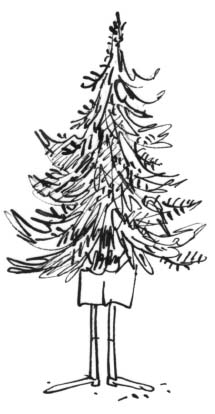
This eBook is copyright material and must not be copied, reproduced, transferred, distributed, leased, licensed or publicly performed or used in any way except as specifically permitted in writing by the publishers, as allowed under the terms and conditions under which it was purchased or as strictly permitted by applicable copyright law. Any unauthorised distribution or use of this text may be a direct infringement of the author's and publisher's rights and those responsible may be liable in law accordingly.
ISBN 9781407047751
Version 1.0
GRIMBLE AT CHRISTMAS
A JONATHAN CAPE BOOK
Published in Great Britain by Jonathan Cape,
an imprint of Random House Children's Books
A Random House Group Company
First published by Puffin Books 1974
This edition published 2008
1 3 5 7 9 10 8 6 4 2
Text copyright © Clement Freud, 1974
Illustrations copyright © Quentin Blake, 1974
Cover illustration copyright © Quentin Blake, 2008
The right of Clement Freud to be identified as the author of this work has
been asserted in accordance with the Copyright, Designs and Patents Act 1988.
This electronic book is sold subject to the condition that it shall not by way of trade or otherwise, be lent, resold, hired out, or otherwise circulated without the publisher's prior consent in any form other than that in which it is published and without a similar condition including this condition being imposed on the subsequent purchaser
RANDOM HOUSE CHILDREN'S BOOKS
61–63 Uxbridge Road, London W5 5SA
Addresses for companies within The Random House Group Limited can be found at:
www.randomhouse.co.uk/offices.htm
THE RANDOM HOUSE GROUP Limited Reg. No. 954009
A CIP catalogue record for this book is available from the British Library.
ISBN: 9781407047751
Version 1.0
at
CHRISTMAS
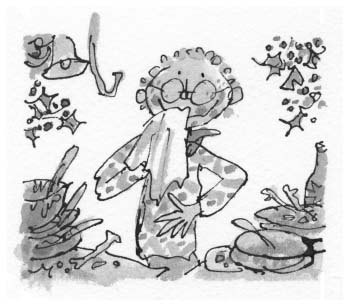
C
LEMENT
F
REUD
Illustrated by Quentin Blake

To my grandchildren especially
Alexandra, Tom, Jack, Martha, Harry, Max,
Nicholas, Joshua, Sophie, Scarlett, Jake, Charlie,
Spike, Gorge, Jonah, Charlotte and Samson
 1. Seven Shopping
1. Seven ShoppingDays to Christmas
Grimble's parents were very forgetful. This was
sometimes annoying, but having a forgetful
father and mother also had advantages. For
instance it meant that he had better bedtimes than
most other children.Quite often he used to go into
his father's room and say, "I'm going to bed now;
it's midnight," and his father would say, "Don't
wait up for me," or "Iquique is the only town I
know with two qs!"
For most of the year Grimble – Grimble was his
whole name, his parents had forgotten to give
him any other names – rather enjoyed having a
father and mother who were different from those
of the other boys at school, but when it came to
Christmas there were very definite disadvantages.
Grimble had only two more days of school
before the Christmas holidays started – and the old
Grimbles went around as if it were the middle of
February or the end of August; anyway there was
nothing special about the way they went around.
The shops in the High Street had windows decorated
with lights and Father Christmases and
wrapped-up packages and mince pies and a big
notice saying
ONLY SEVEN MORE SHOPPING DAYS TO CHRISTMAS
on which the number of days
before the twenty-fifth was changed every evening
. . . it was very exciting.
And Grimble's mother went out with a big
shopping bag – and came back with a cabbage, and
one and a half pounds of cod fillets. I don't want to
be unkind about cod fillets. They are perfectly all
right but they just do not make you tingle all over.
Anyway they didn't make Grimble tingle all over.
Grimble had a friend called David Sebastian
Waghorn whose mother had said, "We are going to
have cold turkey on Boxing Day." That is just about
the same as saying, "On Christmas Day, we are
going to have hot roast turkey with stuffing and
gravy and sausages and bacon and roast potatoes
and Brussels sprouts."He waited anxiously for Mrs
Grimble to give some small hint like that. The
evening before she had said, "We haven't got a cat,"
and Mrs Grimble said, "Oh dear nor we have, don't
forget to leave her a saucer of milk."
Grimble watched his parents carefully for any
sign that they might have remembered why he was
going to be on holiday and when, and what sort
of treats he was going to get if he was going to
get treats. He worked hard giving them wellmannered
hints because it was terribly important
to him that Christmas would be, well . . . complete.
One evening he dropped a lot of pine needles on
the carpet . . . but as no one noticed or said anything
and Grimble was very tidy, he got a dustpan
and brush and swept them up again a couple of
days later.
Also he tried to hum "Good King Wenceslaus"
. . . mm mmmmmmmm mm mmmmmm m but
he did not hum very well and his father thinking it
was "God Save The Queen," stood up and when
Grimble had finished humming his father turned
off the television set and went to bed.
So he practised humming some more. David
Sebastian Waghorn had a joke about humming.
"Do you know why humming birds hum? Because
they don't know the words." Grimble thought
David Sebastian Waghorn was a very funny boy.
The day before, Mr Grimble had come into the
house with a large square parcel and Grimble,
knowing that it was not polite to be openly curious,
had gone into the kitchen and watched his father
take the parcel into the study through the slightly
open door. It looked as if it might be a bicycle
taken to pieces or a large box kite or possibly a new
kind of cooker.
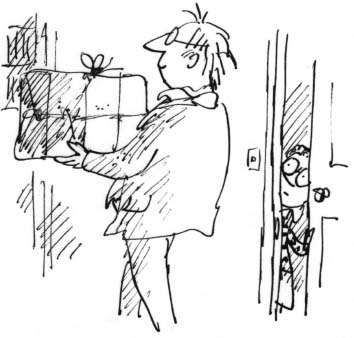
That evening his father said, "Come into the
study and see what I've got in my parcel. It's a footstool,
I gave it to me . . ." and Grimble had
clenched his teeth and said, "Now you can lie back
in your chair and don't even have to bend your
legs." His father was delighted that Grimble had
got the point of the footstool so quickly and
showed him where Iquique was on the globe of
the world . . . it was about halfway down South
America on the left-hand side.
"Do you expect to get anything else for
Christmas . . . except for my presents . . ." he asked
his father in an offhand way. "A lot of weather,"
said his father who had just found Birmingham on
the globe.
That night when Grimble was in bed he started
to think about Christmas very seriously. Christmas
was a holiday and a time for eating interesting food
and giving presents and receiving presents –
someone had told him that it was more blessed to
do one than the other, but he kept forgetting
which.Now the reason why children expected their
parents to do things for them at Christmas was
because parents are better organized than children
and parents have more money than children.
In Grimble's case this was only partly true. His
parents were not nearly as well organized as he;
they kept forgetting to get up in the morning and
sometimes forgot to go to bed for days on end and
they never knew what time it was.
But the old Grimbles did have more money than
he . . . or he hoped they did, because Grimble only
had 19p and an Irish 5p piece. He lay in bed
practicising his humming and wondering whether,
if one was really well organized, as he was – satchel
packed; homework done; toothpaste squeezed out
on to toothbrush; tie tied in a knot and opened
out into a big loop so that it would go over his
head; shoelaces done up so that he could step into
his shoes and wriggle them about till the heels
gave way . . . anyway, if someone were really well
organized, it should not be very difficult for him
to make money . . . and if he had money then he
could arrange the whole family Christmas
celebrations.
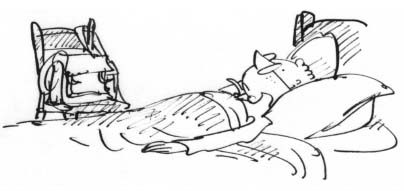
One evening Grimble had listened to a television
programme about money in which a man had said
that the important thing was to find something that
everyone needed. That way, you had a ready market
for whatever you were going to sell . . . for instance
the man explained: "It is a better thing to go from
house to house selling socks, which everyone wears,
than suspenders – which are rubber straps that go
round your leg below the knee and keep the socks
up. Hardly anyone wears suspenders," said the man.
Grimble had never even heard of suspenders. "Also,"
said the man, "you have to spend some of your
money on getting people interested in your wares –
this is called advertising."
Grimble was very impressed and wrote a small
note to remind himself: to sell successfully
you have to find something everyone wants, and
advertise it.
It was quite clear to Grimble that if a man wants
to earn money by selling things, he would have to
buy them first; the simple problem that Grimble
had was what could he buy for 19p that he might
be able to sell for a lot of money – because a turkey
and a Christmas pudding and presents and everything
would cost pounds. One of the masters at
school had told them about an old Greek who was
lying in a bathtub when an apple fell on his head
and he shouted, "Eureka, I've got it!" and invented
gold, or something like that. Grimble lay in his bed
thinking hard waiting to shout, "Eureka, I've got
it!" but he fell asleep.
In the morning he went to the shop on the
corner and as it was empty he looked carefully
around for something that everyone needed that
cost 19p or less. There were rolls of flypaper and
some suntan cream and washing soap and tins of
sardines and lemonade crystals. These were all
dusty, which is a bad sign. Suddenly he saw a loaf
of bread and a great idea occurred to him: everyone
needed bread; if he went around selling bread slice
by slice to people so that they wouldn't have to go
to shops he could become very rich. And then he
thought most people already have bread, but if I
sold toast . . . not only sold it but took it to people
just when they wanted it. When they were sitting
at the breakfast table with butter on the knife and
a marmalade jar in front of them . . . the grimble
home toast delivery service. proprietor
grimble. "Eureka, I've got it!" he shouted and the
old lady came out from the back of the shop and
said, "If you've got it you'd better pay for it. That is
the only way you can do things in a shop."
Grimble was much too excited to explain, so he
paid the lady 6p which was the price of that loaf of
bread and went to school.
He didn't learn much at school that day because
he was working out his toast business. The loaf of
bread was in his locker; it was a cut loaf called
thin sliced which seemed a silly name to give a
loaf and it contained eighteen pieces of bread
wrapped in greaseproof paper. (If the business
really succeeds he thought, I might go into the
greaseproof-paper business.)
Every morning nearly everyone eats toast and,
as toast is quite boring to make, Grimble decided
that if he made toast at seven every morning and
brought it to people all hot and ready they would
definitely pay 21/2p for three slices, which meant
six times three slices in a loaf which is 15p back
for 6p.
When he came home from school he sat down at
his desk and got a large piece of paper and cut it in
half and then cut each half into half again and then
halved the four pieces of paper so that he had eight
small pieces and on each one he wrote the message
the grimble home toast delivery service. proprietor
grimble founded 1974. On the other side
he wrote: Toast delivered, daily, tidily, un-burnedly,
punctually. 21/2p for three slices. Our representative
will call tomorrow morning with a free slice and
awaits the pleasure of your order.
He took the eight pieces of paper and put four
of them through the letter boxes of the four houses
up the hill from his house and posted the other
four through the doors on the downhill side. As he
was going back home he decided that as he did not
know a great deal about toast he had better go and
see Madame Beryl, who was a fat kind friend of his
mother's who kept a bakery shop and knew a lot
about things like that.
"Good afternoon," said Grimble, entering the
shop. "I would like to have a small discussion with
you about bread." "I prefer," said Madame Beryl,
"to talk about cake." "I meant to say toast," said
Grimble. "I still meant cake," said Madame Beryl.
She eased her right foot out of her shoe, which
came away with a small sigh of relief, and said, "I
would very much like to talk to you about bread
and
toast but unfortunately I have to go and see a
man about a wedding breakfast. Can it wait until
after Christmas?"
"I am afraid," said Grimble, "that after
Christmas will be exactly too late." There was a
small silence. "I have done a very silly thing," said
Madame Beryl. "I baked a cake which had not
been ordered and now I don't know what to do
with it and the dustbin is full. Do you think you
would be very kind and take possession of it?" "Oh,
yes, thank you," said Grimble, "if it is really in your
way." And Madame Beryl put her foot back into
her protesting shoe, got a quite large cake, gave it
to Grimble, said, "Oh dear, I must fly," and started
moving into the street like a cabin trunk. "About
toast," said Grimble following her. "Not toast,"
puffed Madame Beryl. "Never toast cake. Ice it
with icing sugar and egg white," and she waddled
onto a bus.